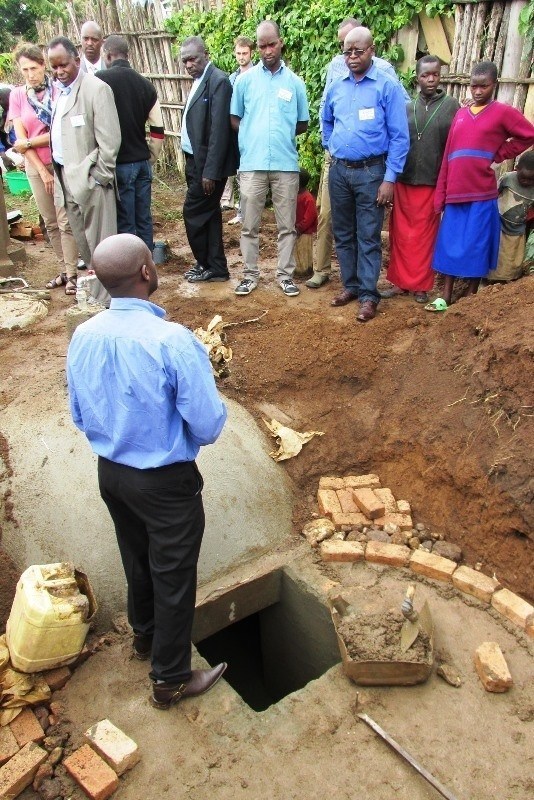Project ‘EVE’ is a development project executed by VSF Belgium and local partner IMBARAGA (an association of small-holder peasant farmers) in the three districts of Huye, Nyanza and Nyamagabe in Rwanda’s Southern Province, over 3 years (2014-2016).
The project aims to strengthen the capacities of poor small-holder beneficiary farmers in these 3 districts so that they can sustainably improve their food security and economic livelihoods from the following project activities: small animal restocking (goats, pigs, rabbits) and integrated agriculture and livestock production, using animal manure for kitchen garden vegetable production. Other complementary activities include supporting private veterinarians in outlying rural areas; promoting renewable energy by installing household family biogas units; increasing IMBARAGA small farmers’ groups access to micro-credit finance; and strengthening capacities of IMBARAGA organization at the institutional level.
The day started with a visit to a woman veterinary technician (something of a rarity in Rwanda as the majority of vets are men), Miss Josée KABEGA, who has been selected by the project to receive financial credit support to better develop her
activities for livestock breeders in the zone, e.g. to buy a motorbike for visiting farmers, veterinary products and equipment. She will also receive trainings in small business management to develop her business.
The visitors also visited two dairy farms with bio-gas digesters in construction: these bio-digesters will be fed with cow dung which will be converted into methane gas for cooking and lighting.
Among the major advantages of this ‘green’ energy are the savings made in buying fire-wood or charcoal (fuel sources which are becoming increasingly expensive); use of the cow dung residue, or ‘bioslurry’, as a free and organic source of fertilizer for crops and vegetable production; and a reduction in respiratory and eye diseases in women linked to smoke produced from the traditional cooking-stoves previously used.
The field visits finished with visits to two poor farmer’ households who received small livestock, goats and pigs. These farmers selected to receive either 2 goats or 1 sow, and have committed to ‘reimburse’ the same number of animals received to the project, which will in turn pass-on these animals to neighbouring poor farmers in the same village, in a livestock revolving credit system.
On returning to Nyamagabe town, all the visitors were invited to a buffet lunch at the ‘Golden Monkey’ hotel, which was followed by speeches given by the different representatives from VSF Belgium, IMBARAGA and the local authorities.
This project, which is financed by the Belgian cooperation, will finish in December 2016. There is still a long way to go, but with the enthusiasm and willingness already shown by the project team, assisted by VSF on the ground, we hope to be able to reach a large number of small Rwandese farmers and visibly improve their lives thanks to all these different activities.

